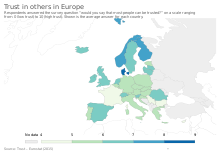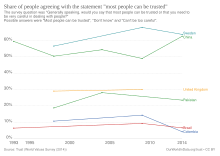
Back ثقة (علم الاجتماع) Arabic Enfotu AST Давер Byelorussian Доверие Bulgarian Confiança Catalan Důvěra Czech Шанăç CV Tillid Danish Vertrauen German Εμπιστοσύνη Greek



| Part of a series on |
| Emotions |
|---|
  |
Trust is the belief that another person will do what is expected. It brings with it a willingness for one party (the trustor) to become vulnerable to another party (the trustee), on the presumption that the trustee will act in ways that benefit the trustor.[1][2][3] In addition, the trustor does not have control over the actions of the trustee.[1] Scholars distinguish between generalized trust (also known as social trust), which is the extension of trust to a relatively large circle of unfamiliar others, and particularized trust, which is contingent on a specific situation or a specific relationship.[1]
As the trustor is uncertain about the outcome of the trustee's actions, the trustor can only develop and evaluate expectations. Such expectations are formed with a view to the motivations of the trustee, dependent on their characteristics, the situation, and their interaction.[4][page needed] The uncertainty stems from the risk of failure or harm to the trustor if the trustee does not behave as desired.
In the social sciences, the subtleties of trust are a subject of ongoing research. In sociology and psychology, the degree to which one party trusts another is a measure of belief in the honesty, fairness, or benevolence of another party. The term "confidence" is more appropriate for a belief in the competence of the other party.[5][6][citation needed] A failure in trust may be forgiven more easily if it is interpreted as a failure of competence rather than a lack of benevolence or honesty.[7][page needed] In economics, trust is often conceptualized as reliability in transactions. In all cases, trust is a heuristic decision rule, allowing a person to deal with complexities that would require unrealistic effort in rational reasoning.[8]
- ^ a b c Schilke, Oliver; Reimann, Martin; Cook, Karen S. (2021). "Trust in Social Relations". Annual Review of Sociology. 47 (1): 239–259. doi:10.1146/annurev-soc-082120-082850. ISSN 0360-0572. S2CID 231685149.
- ^ Mayer, R.C.; Davis, J.H.; Schoorman, F.D. (1995). "An integrative model of organizational trust". Academy of Management Review. 20 (3): 709–734. CiteSeerX 10.1.1.457.8429. doi:10.5465/amr.1995.9508080335. S2CID 15027176.
- ^
- Lynn, Theo (2021). Data privacy and trust in cloud computing : building trust in the cloud through assurance and accountability. Palgrave Studies in Digital Business & Enabling Technologies. Cham: Springer. p. 20. doi:10.1007/978-3-030-54660-1. ISBN 978-3-030-54659-5. OCLC 1202743216. S2CID 242965934.
Trust is generally defined as a willingness to accept vulnerability based on positive expectation of another party.
- Bamberger, Walter (2010). "Interpersonal Trust – Attempt of a Definition". Technische Universität München. Archived from the original on 2011-10-09. Retrieved 2011-08-16.
- Lynn, Theo (2021). Data privacy and trust in cloud computing : building trust in the cloud through assurance and accountability. Palgrave Studies in Digital Business & Enabling Technologies. Cham: Springer. p. 20. doi:10.1007/978-3-030-54660-1. ISBN 978-3-030-54659-5. OCLC 1202743216. S2CID 242965934.
- ^ Hardin, Russell (2002-03-21). Trust and Trustworthiness. Russell Sage Foundation. ISBN 978-1-61044-271-8.
- ^ Leiter, Michael P.; Day, Arla; Price, Lisa (2015-03-01). "Attachment styles at work: Measurement, collegial relationships, and burnout". Burnout Research. 2 (1): 25–35. doi:10.1016/j.burn.2015.02.003. hdl:10536/DRO/DU:30089731. ISSN 2213-0586.
- ^ Cook, John; Wall, Toby (1980-03-01). "New work attitude measures of trust, organizational commitment and personal need non-fulfilment". Journal of Occupational Psychology. 53 (1): 39–52. doi:10.1111/j.2044-8325.1980.tb00005.x. ISSN 0305-8107.
- ^ Nooteboom, B. (2017). Trust: Forms, Foundations, Functions, Failures and Figures. Edward Elgar Publishing. ISBN 9781781950883.
- ^ Lewicki, Roy; Brinsfield, Chad (2011). "Trust as a heuristic". Framing Matters: Perspectives on Negotiation Research and Practice in Communication. Peter Lang Publishing.
© MMXXIII Rich X Search. We shall prevail. All rights reserved. Rich X Search